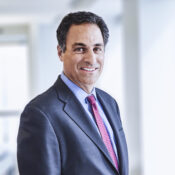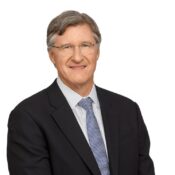Humanizing ESG:
Why Diversity, Wage Inequality, and Workers Rights Deserve Our Attention
As the COVID crisis rewires our society and further emphasizes the inequality among different professions, classes, racial groups, and nationalities, the social side of ESG is rising in attention. This panel discussed what measurements investors and managers should utilize to evaluate myriad societal challenges, including a company’s impact on human rights, labor standards, gender equality, racial justice, wealth inequality, and overall customer well-being. Ultimately, we explored the business case for industry to minimize harm and be a positive force in addressing these fundamental social challenges.
See media coverage on the launch of the Beyond Business ESG series. Read articles from Knowledge@Wharton and about the event. Watch a recap of the lecture through the link below.

Moderator
Erika H. James, Dean, The Wharton School
Dean James began her tenure at Wharton July 1, 2020 and in doing so became the first-ever woman and African American to lead the country’s oldest collegiate school of business. Prior to Wharton, she was dean of Goizueta Business School at Emory University. Throughout Dean James’ award-winning career as a researcher and instructor she has investigated issues of diversity, leadership and crisis management. She is the author of numerous journal articles, co-author of the book, “Leading Under Pressure: From Surviving to Thriving Before, During, and After a Crisis” and was named one of the “Top 10 Women of Power in Education” by Black Enterprise magazine.

Panelists
Witold Henisz, Deloitte & Touche Professor of Management in Honor of Russell E. Palmer, Former Managing Partner, The Wharton School
Witold J. Henisz is the Deloitte & Touche Professor of Management in Honor of Russell E. Palmer, former Managing Partner at the Wharton School, University of Pennsylvania. He is also Director of the Wharton Political Risk Lab and the founder of the Wharton ESG Analytics Lab. His research examines the impact of political hazards as well as environmental, social and governance factors more broadly on the strategy and valuation of global corporations. This work analyzes best practices in corporate diplomacy to win the hearts and minds of external stakeholders as well as the measurement and valuation thereof. His most recent work focuses on the application of alternative data to the measurement of non-traditional political and ESG risks and opportunities and their financial and operational impact on multinational firms as well as the performance of the asset managers that invest in them. His research has been published in top-ranked journals in international business, management, international studies and sociology and he is the author of the book, Corporate Diplomacy: Building Reputations and Relationships with External Stakeholders. He is a Fellow of the Academy of International Business.
Witold has won multiple teaching awards including being named Iron Prof (2019) and an Aspen Institute Ideas Worth Teaching Award Winner (2020). He teaches extensively on the topic of Corporate Diplomacy as well as ESG integration in open enrollment and custom executive education programs.
He is currently a principal in the consultancy PRIMA LLC whose clients span multinational firms, asset managers, intergovernmental organizations and non-governmental organizations.

Andrew D. Plepler, Global Head of Environmental, Social & Governance, Bank of America
Andrew D. Plepler is Bank of America’s Global head of ESG. In this role, Plepler spearheads the company’s focus on environmental, social and governance issues. He engages with a broad range of internal and external stakeholders, including the company’s executive management committee, investors, clients, consumer advocates and community leaders, to help inform and shape the bank’s strategies, policies, practices and programs.
Bank of America’s commitment to responsible, sustainable growth, and to strong ESG practices can be seen in the way the company operates, the inclusive and supportive workplace it creates for employees, the responsible products and services offered to customers and the impact it makes around the world in helping local economies thrive.
Plepler is responsible for a range of programs that embody the company’s ESG activities and are aligned with the United Nation’s Sustainable Development Goals. In response to the racial wealth gap exacerbated by the coronavirus and the killings of black civilians in numerous communities, Plepler helped develop the company’s $1.25 billion five-year commitment to advance racial equality and economic opportunity for people and communities of color. His team has led work to address challenges brought on by the coronavirus, including philanthropic support and capital investments in CDFIs designed to support small businesses.
Plepler is a key driver of the work focusing on the work across the enterprise to transition to low-carbon, and other sustainable businesses through the company’s goal to achieve net zero greenhouse gas emissions in its operations, supply chain and financing activities before 2050, and $1 trillion environmental business commitment. He also helps advance economic mobility for individuals and families in local communities and ensures strong ESG governance and oversight across the business. He chairs the bank’s National Community Advisory Council, which for more than fifteen years has brought together public, nonprofit and private sector leaders to provide external perspective and advise the bank on responsible business practices.
Prior to joining Bank of America, Plepler served as senior vice president of Housing and Community Initiatives with the Fannie Mae Foundation. Plepler earned a Bachelor of Arts degree in government from Franklin & Marshall College in Lancaster, Pa., and a Juris Doctorate from the University of Miami School of Law in Coral Gables, Fla.
Plepler founded and continues to serve on the board of the Washington, DC-based Urban Alliance Foundation, a nonprofit jobs and mentoring program that works with economically disadvantaged high school students. Plepler has three children and two stepchildren and lives with his wife in Charlotte, N.C. Follow @aplep.

John Streur, President & CEO, Calvert Research and Management
John Streur is president and chief executive officer for Calvert Research and Management. John is also president and a trustee of the Calvert Funds as well as a board director of Calvert Impact Capital and chair of its Audit and Finance Committee. He guided the creation of the Calvert Principles for Responsible Investment, the Calvert Research System and the Calvert Indices, and has placed focus on investment research and emphasis on environmental, social and governance (ESG) factors integrated with investment decisions. He joined Calvert Research and Management in 2016.
John began his career in the investment management industry in 1987. Before joining Calvert Research and Management, he was president and chief executive officer with Calvert Investments. He has managed socially responsible investments at the request of institutional clients, including public funds, religious institutions, and college and university endowments since 1991. Previously, he was president, director and principal of Portfolio 21, a boutique firm specializing in global environmental investing, and spent 20 years at AMG Funds (and its predecessors), a firm he co-founded and where he served as president, CEO and chair of the Investment Committee.
John is a founding member of the Investor Advisory Group for the Sustainable Accounting Standards Board (SASB), a group of leading asset owners and asset managers committed to improving the quality and comparability of sustainability-related disclosure by corporations for use by investors. He is also one of eight members of the Leadership Council of the Impact-Weighted Global Accounts Initiative, which seeks to drive the creation of financial accounts that reflect a company’s financial, social and environmental performance. As part of the council, John is responsible for creating accounting statements that transparently capture the impact that companies have on society and the environment. He is also a member of Merck’s External Sustainability Advisory Council.
John earned a B.S. from the University of Wisconsin, College of Agriculture and Life Sciences.
An expansion of the Tarnopol Dean’s Lecture series, Beyond Business is an ongoing conversation that tackles the most complex and pressing issues impacting individuals and organizations across the world.



